Hospitality Industry Report: Examining Scale, Scope, and Impact
VerifiedAdded on 2022/12/23
|8
|2487
|47
Report
AI Summary
This report provides an introduction to the hospitality industry, exploring its scale, scope, and diversity. It delves into the industry's contribution to GDP, examines various sectors like food and beverage, travel and tourism, lodging, and recreation, and analyzes the range of products offered, including rooms, restaurants, and business services. The report also discusses different ownership structures, such as franchise, privately owned, and leased models. Furthermore, it assesses the positive and negative impacts of the hospitality industry, including its role in job creation, revenue generation, and environmental considerations. The report concludes with recommendations for sustainable practices and strategic business planning within the hospitality sector, emphasizing the importance of ecological factors and corporate social responsibility.
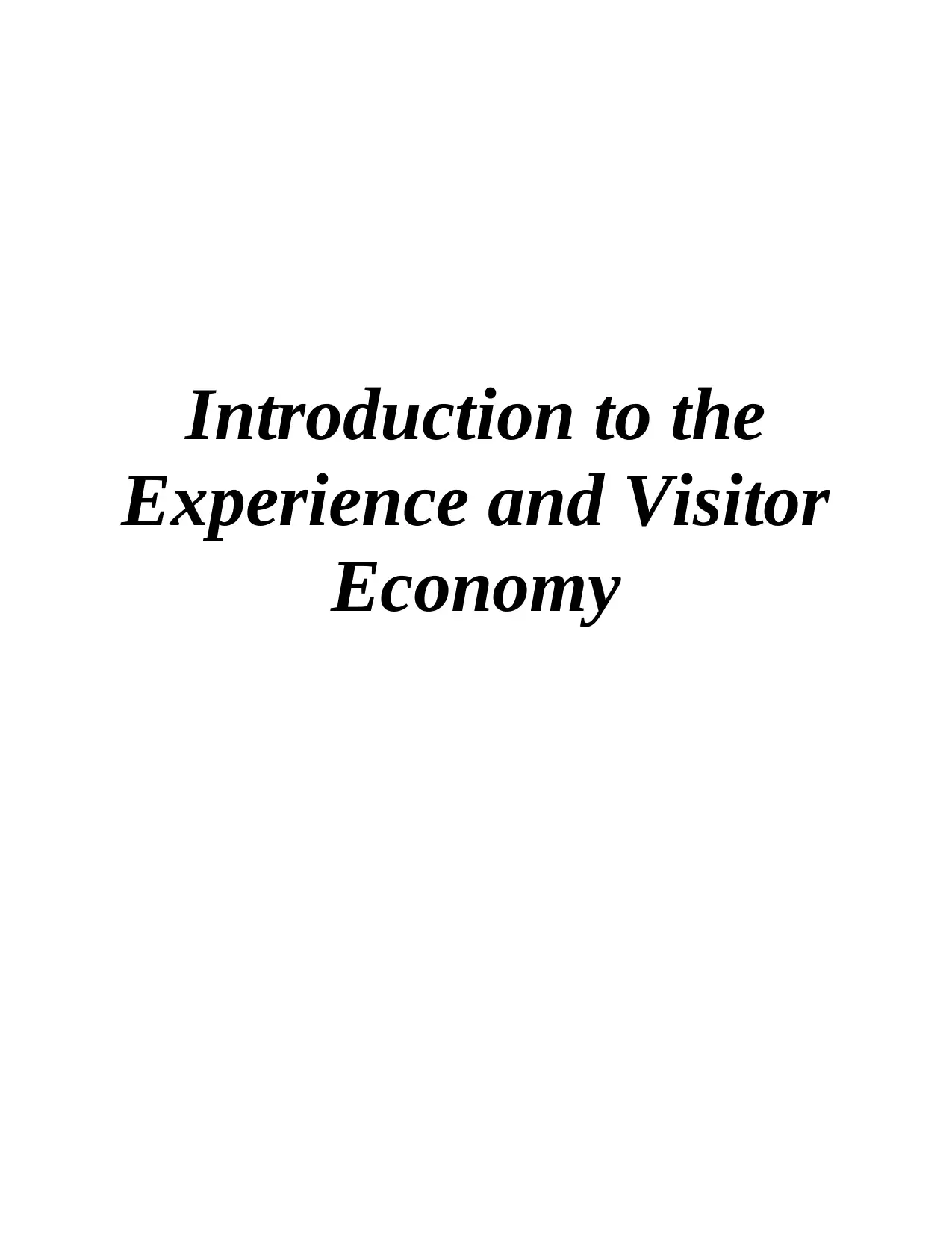
Introduction to the
Experience and Visitor
Economy
Experience and Visitor
Economy
Paraphrase This Document
Need a fresh take? Get an instant paraphrase of this document with our AI Paraphraser
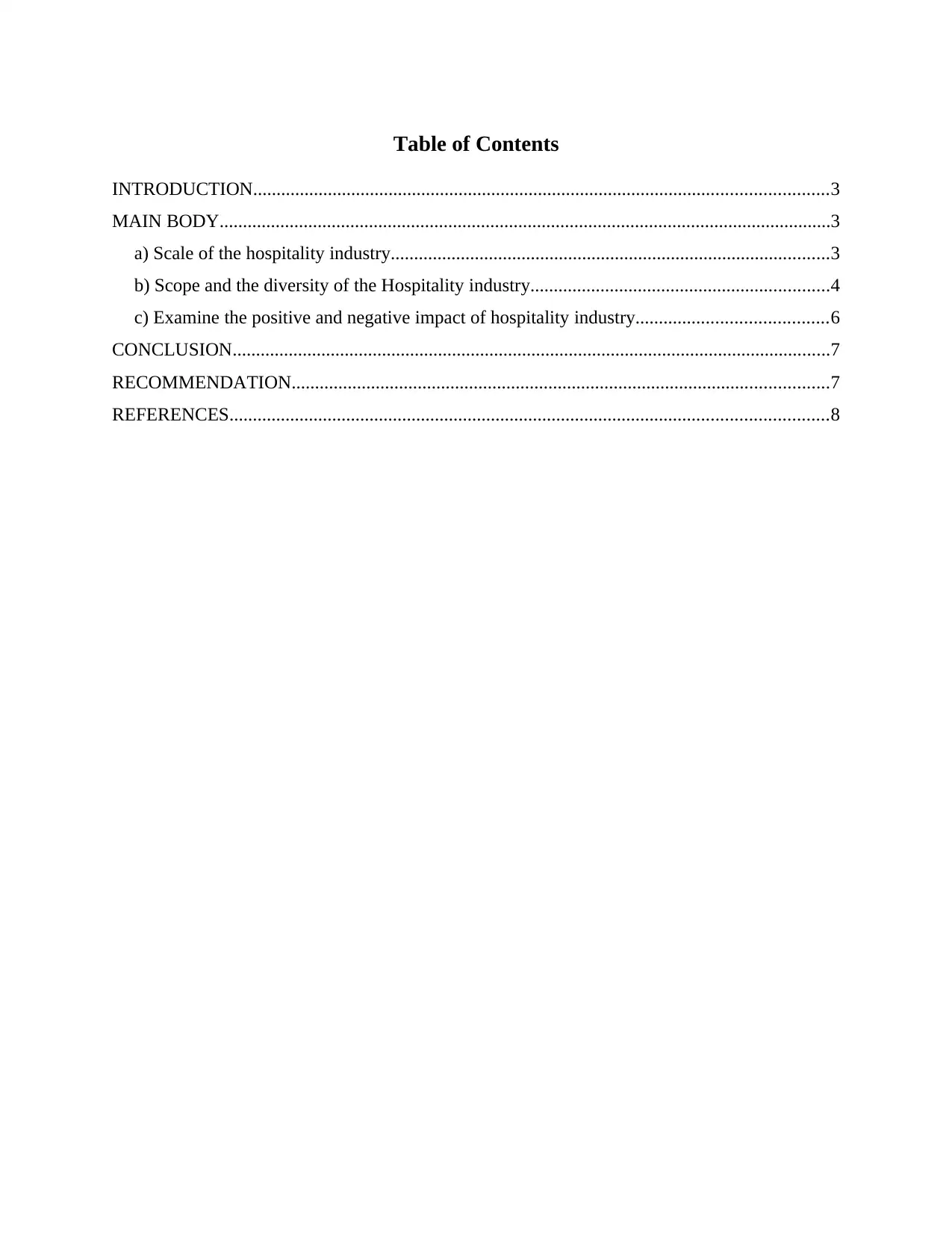
Table of Contents
INTRODUCTION...........................................................................................................................3
MAIN BODY...................................................................................................................................3
a) Scale of the hospitality industry..............................................................................................3
b) Scope and the diversity of the Hospitality industry................................................................4
c) Examine the positive and negative impact of hospitality industry.........................................6
CONCLUSION................................................................................................................................7
RECOMMENDATION...................................................................................................................7
REFERENCES................................................................................................................................8
INTRODUCTION...........................................................................................................................3
MAIN BODY...................................................................................................................................3
a) Scale of the hospitality industry..............................................................................................3
b) Scope and the diversity of the Hospitality industry................................................................4
c) Examine the positive and negative impact of hospitality industry.........................................6
CONCLUSION................................................................................................................................7
RECOMMENDATION...................................................................................................................7
REFERENCES................................................................................................................................8
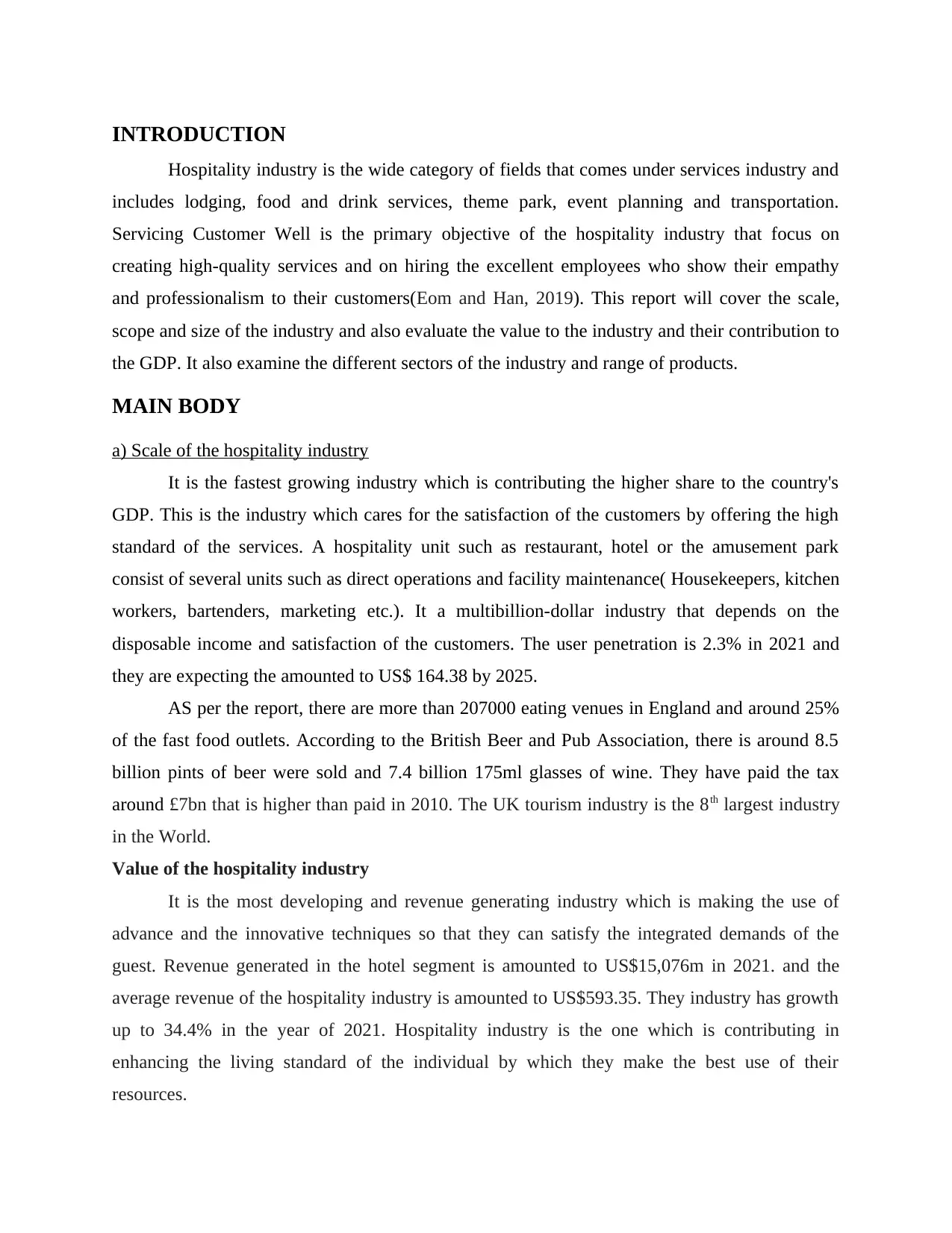
INTRODUCTION
Hospitality industry is the wide category of fields that comes under services industry and
includes lodging, food and drink services, theme park, event planning and transportation.
Servicing Customer Well is the primary objective of the hospitality industry that focus on
creating high-quality services and on hiring the excellent employees who show their empathy
and professionalism to their customers(Eom and Han, 2019). This report will cover the scale,
scope and size of the industry and also evaluate the value to the industry and their contribution to
the GDP. It also examine the different sectors of the industry and range of products.
MAIN BODY
a) Scale of the hospitality industry
It is the fastest growing industry which is contributing the higher share to the country's
GDP. This is the industry which cares for the satisfaction of the customers by offering the high
standard of the services. A hospitality unit such as restaurant, hotel or the amusement park
consist of several units such as direct operations and facility maintenance( Housekeepers, kitchen
workers, bartenders, marketing etc.). It a multibillion-dollar industry that depends on the
disposable income and satisfaction of the customers. The user penetration is 2.3% in 2021 and
they are expecting the amounted to US$ 164.38 by 2025.
AS per the report, there are more than 207000 eating venues in England and around 25%
of the fast food outlets. According to the British Beer and Pub Association, there is around 8.5
billion pints of beer were sold and 7.4 billion 175ml glasses of wine. They have paid the tax
around £7bn that is higher than paid in 2010. The UK tourism industry is the 8th largest industry
in the World.
Value of the hospitality industry
It is the most developing and revenue generating industry which is making the use of
advance and the innovative techniques so that they can satisfy the integrated demands of the
guest. Revenue generated in the hotel segment is amounted to US$15,076m in 2021. and the
average revenue of the hospitality industry is amounted to US$593.35. They industry has growth
up to 34.4% in the year of 2021. Hospitality industry is the one which is contributing in
enhancing the living standard of the individual by which they make the best use of their
resources.
Hospitality industry is the wide category of fields that comes under services industry and
includes lodging, food and drink services, theme park, event planning and transportation.
Servicing Customer Well is the primary objective of the hospitality industry that focus on
creating high-quality services and on hiring the excellent employees who show their empathy
and professionalism to their customers(Eom and Han, 2019). This report will cover the scale,
scope and size of the industry and also evaluate the value to the industry and their contribution to
the GDP. It also examine the different sectors of the industry and range of products.
MAIN BODY
a) Scale of the hospitality industry
It is the fastest growing industry which is contributing the higher share to the country's
GDP. This is the industry which cares for the satisfaction of the customers by offering the high
standard of the services. A hospitality unit such as restaurant, hotel or the amusement park
consist of several units such as direct operations and facility maintenance( Housekeepers, kitchen
workers, bartenders, marketing etc.). It a multibillion-dollar industry that depends on the
disposable income and satisfaction of the customers. The user penetration is 2.3% in 2021 and
they are expecting the amounted to US$ 164.38 by 2025.
AS per the report, there are more than 207000 eating venues in England and around 25%
of the fast food outlets. According to the British Beer and Pub Association, there is around 8.5
billion pints of beer were sold and 7.4 billion 175ml glasses of wine. They have paid the tax
around £7bn that is higher than paid in 2010. The UK tourism industry is the 8th largest industry
in the World.
Value of the hospitality industry
It is the most developing and revenue generating industry which is making the use of
advance and the innovative techniques so that they can satisfy the integrated demands of the
guest. Revenue generated in the hotel segment is amounted to US$15,076m in 2021. and the
average revenue of the hospitality industry is amounted to US$593.35. They industry has growth
up to 34.4% in the year of 2021. Hospitality industry is the one which is contributing in
enhancing the living standard of the individual by which they make the best use of their
resources.
⊘ This is a preview!⊘
Do you want full access?
Subscribe today to unlock all pages.

Trusted by 1+ million students worldwide
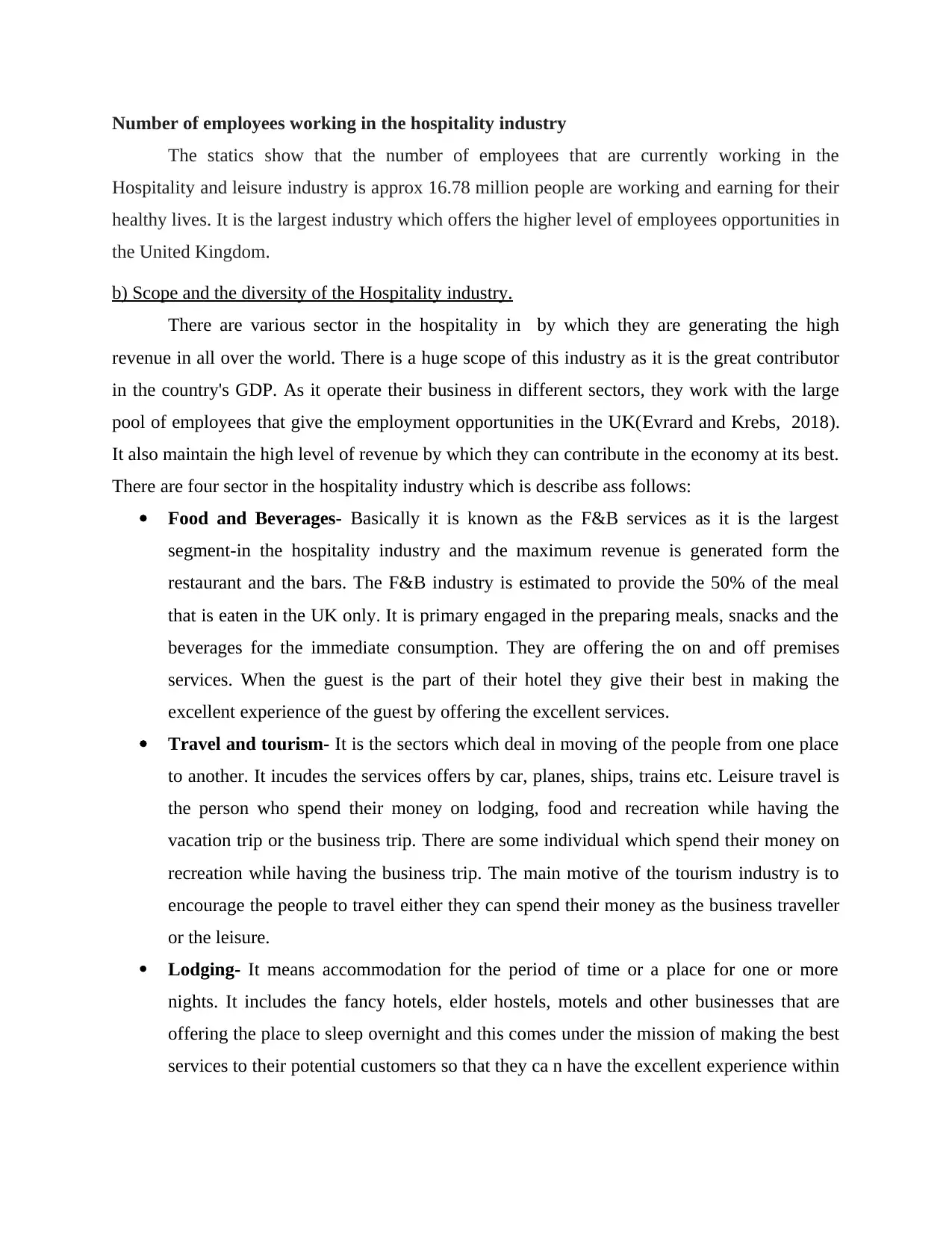
Number of employees working in the hospitality industry
The statics show that the number of employees that are currently working in the
Hospitality and leisure industry is approx 16.78 million people are working and earning for their
healthy lives. It is the largest industry which offers the higher level of employees opportunities in
the United Kingdom.
b) Scope and the diversity of the Hospitality industry.
There are various sector in the hospitality in by which they are generating the high
revenue in all over the world. There is a huge scope of this industry as it is the great contributor
in the country's GDP. As it operate their business in different sectors, they work with the large
pool of employees that give the employment opportunities in the UK(Evrard and Krebs, 2018).
It also maintain the high level of revenue by which they can contribute in the economy at its best.
There are four sector in the hospitality industry which is describe ass follows:
Food and Beverages- Basically it is known as the F&B services as it is the largest
segment-in the hospitality industry and the maximum revenue is generated form the
restaurant and the bars. The F&B industry is estimated to provide the 50% of the meal
that is eaten in the UK only. It is primary engaged in the preparing meals, snacks and the
beverages for the immediate consumption. They are offering the on and off premises
services. When the guest is the part of their hotel they give their best in making the
excellent experience of the guest by offering the excellent services.
Travel and tourism- It is the sectors which deal in moving of the people from one place
to another. It incudes the services offers by car, planes, ships, trains etc. Leisure travel is
the person who spend their money on lodging, food and recreation while having the
vacation trip or the business trip. There are some individual which spend their money on
recreation while having the business trip. The main motive of the tourism industry is to
encourage the people to travel either they can spend their money as the business traveller
or the leisure.
Lodging- It means accommodation for the period of time or a place for one or more
nights. It includes the fancy hotels, elder hostels, motels and other businesses that are
offering the place to sleep overnight and this comes under the mission of making the best
services to their potential customers so that they ca n have the excellent experience within
The statics show that the number of employees that are currently working in the
Hospitality and leisure industry is approx 16.78 million people are working and earning for their
healthy lives. It is the largest industry which offers the higher level of employees opportunities in
the United Kingdom.
b) Scope and the diversity of the Hospitality industry.
There are various sector in the hospitality in by which they are generating the high
revenue in all over the world. There is a huge scope of this industry as it is the great contributor
in the country's GDP. As it operate their business in different sectors, they work with the large
pool of employees that give the employment opportunities in the UK(Evrard and Krebs, 2018).
It also maintain the high level of revenue by which they can contribute in the economy at its best.
There are four sector in the hospitality industry which is describe ass follows:
Food and Beverages- Basically it is known as the F&B services as it is the largest
segment-in the hospitality industry and the maximum revenue is generated form the
restaurant and the bars. The F&B industry is estimated to provide the 50% of the meal
that is eaten in the UK only. It is primary engaged in the preparing meals, snacks and the
beverages for the immediate consumption. They are offering the on and off premises
services. When the guest is the part of their hotel they give their best in making the
excellent experience of the guest by offering the excellent services.
Travel and tourism- It is the sectors which deal in moving of the people from one place
to another. It incudes the services offers by car, planes, ships, trains etc. Leisure travel is
the person who spend their money on lodging, food and recreation while having the
vacation trip or the business trip. There are some individual which spend their money on
recreation while having the business trip. The main motive of the tourism industry is to
encourage the people to travel either they can spend their money as the business traveller
or the leisure.
Lodging- It means accommodation for the period of time or a place for one or more
nights. It includes the fancy hotels, elder hostels, motels and other businesses that are
offering the place to sleep overnight and this comes under the mission of making the best
services to their potential customers so that they ca n have the excellent experience within
Paraphrase This Document
Need a fresh take? Get an instant paraphrase of this document with our AI Paraphraser
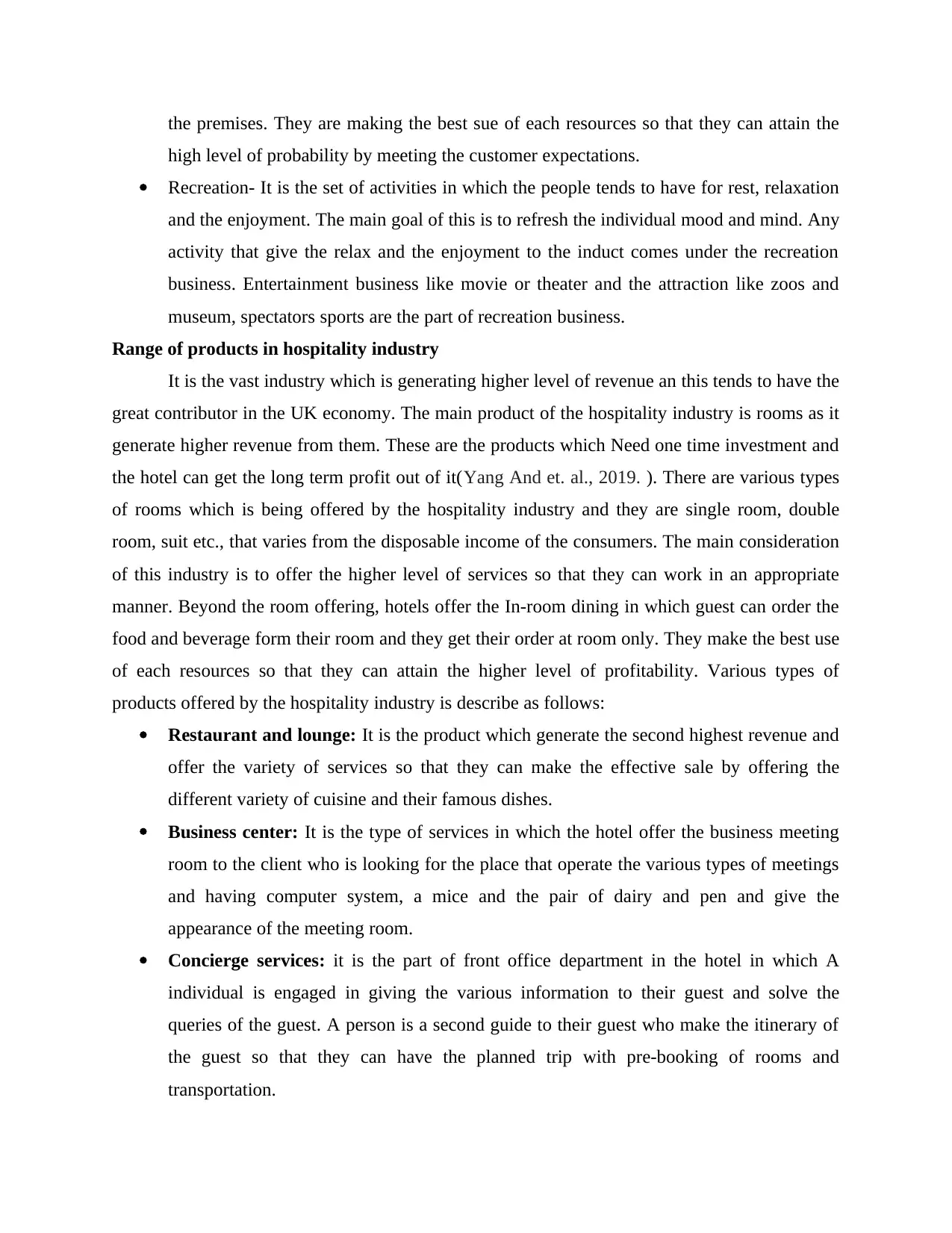
the premises. They are making the best sue of each resources so that they can attain the
high level of probability by meeting the customer expectations.
Recreation- It is the set of activities in which the people tends to have for rest, relaxation
and the enjoyment. The main goal of this is to refresh the individual mood and mind. Any
activity that give the relax and the enjoyment to the induct comes under the recreation
business. Entertainment business like movie or theater and the attraction like zoos and
museum, spectators sports are the part of recreation business.
Range of products in hospitality industry
It is the vast industry which is generating higher level of revenue an this tends to have the
great contributor in the UK economy. The main product of the hospitality industry is rooms as it
generate higher revenue from them. These are the products which Need one time investment and
the hotel can get the long term profit out of it(Yang And et. al., 2019. ). There are various types
of rooms which is being offered by the hospitality industry and they are single room, double
room, suit etc., that varies from the disposable income of the consumers. The main consideration
of this industry is to offer the higher level of services so that they can work in an appropriate
manner. Beyond the room offering, hotels offer the In-room dining in which guest can order the
food and beverage form their room and they get their order at room only. They make the best use
of each resources so that they can attain the higher level of profitability. Various types of
products offered by the hospitality industry is describe as follows:
Restaurant and lounge: It is the product which generate the second highest revenue and
offer the variety of services so that they can make the effective sale by offering the
different variety of cuisine and their famous dishes.
Business center: It is the type of services in which the hotel offer the business meeting
room to the client who is looking for the place that operate the various types of meetings
and having computer system, a mice and the pair of dairy and pen and give the
appearance of the meeting room.
Concierge services: it is the part of front office department in the hotel in which A
individual is engaged in giving the various information to their guest and solve the
queries of the guest. A person is a second guide to their guest who make the itinerary of
the guest so that they can have the planned trip with pre-booking of rooms and
transportation.
high level of probability by meeting the customer expectations.
Recreation- It is the set of activities in which the people tends to have for rest, relaxation
and the enjoyment. The main goal of this is to refresh the individual mood and mind. Any
activity that give the relax and the enjoyment to the induct comes under the recreation
business. Entertainment business like movie or theater and the attraction like zoos and
museum, spectators sports are the part of recreation business.
Range of products in hospitality industry
It is the vast industry which is generating higher level of revenue an this tends to have the
great contributor in the UK economy. The main product of the hospitality industry is rooms as it
generate higher revenue from them. These are the products which Need one time investment and
the hotel can get the long term profit out of it(Yang And et. al., 2019. ). There are various types
of rooms which is being offered by the hospitality industry and they are single room, double
room, suit etc., that varies from the disposable income of the consumers. The main consideration
of this industry is to offer the higher level of services so that they can work in an appropriate
manner. Beyond the room offering, hotels offer the In-room dining in which guest can order the
food and beverage form their room and they get their order at room only. They make the best use
of each resources so that they can attain the higher level of profitability. Various types of
products offered by the hospitality industry is describe as follows:
Restaurant and lounge: It is the product which generate the second highest revenue and
offer the variety of services so that they can make the effective sale by offering the
different variety of cuisine and their famous dishes.
Business center: It is the type of services in which the hotel offer the business meeting
room to the client who is looking for the place that operate the various types of meetings
and having computer system, a mice and the pair of dairy and pen and give the
appearance of the meeting room.
Concierge services: it is the part of front office department in the hotel in which A
individual is engaged in giving the various information to their guest and solve the
queries of the guest. A person is a second guide to their guest who make the itinerary of
the guest so that they can have the planned trip with pre-booking of rooms and
transportation.
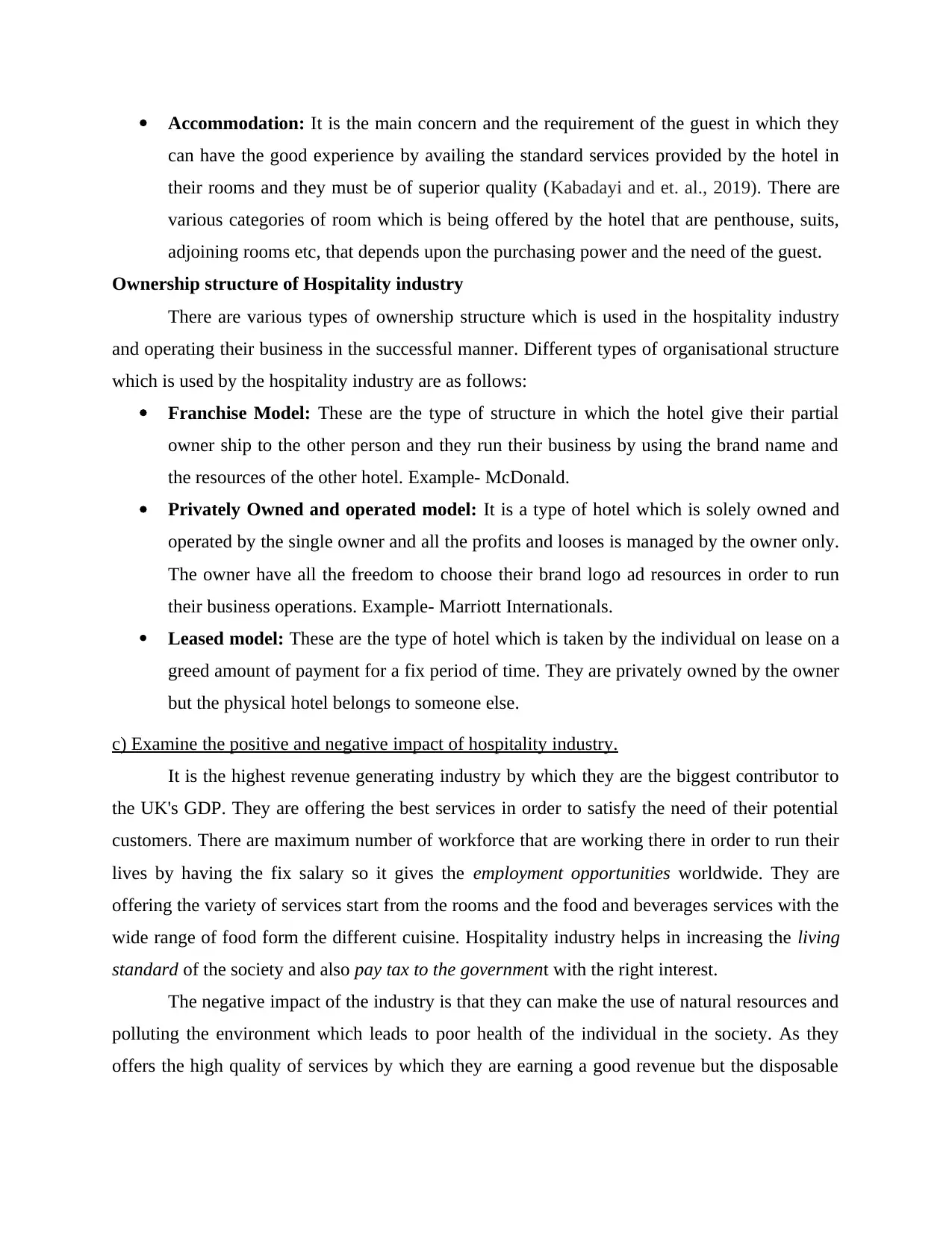
Accommodation: It is the main concern and the requirement of the guest in which they
can have the good experience by availing the standard services provided by the hotel in
their rooms and they must be of superior quality (Kabadayi and et. al., 2019). There are
various categories of room which is being offered by the hotel that are penthouse, suits,
adjoining rooms etc, that depends upon the purchasing power and the need of the guest.
Ownership structure of Hospitality industry
There are various types of ownership structure which is used in the hospitality industry
and operating their business in the successful manner. Different types of organisational structure
which is used by the hospitality industry are as follows:
Franchise Model: These are the type of structure in which the hotel give their partial
owner ship to the other person and they run their business by using the brand name and
the resources of the other hotel. Example- McDonald.
Privately Owned and operated model: It is a type of hotel which is solely owned and
operated by the single owner and all the profits and looses is managed by the owner only.
The owner have all the freedom to choose their brand logo ad resources in order to run
their business operations. Example- Marriott Internationals.
Leased model: These are the type of hotel which is taken by the individual on lease on a
greed amount of payment for a fix period of time. They are privately owned by the owner
but the physical hotel belongs to someone else.
c) Examine the positive and negative impact of hospitality industry.
It is the highest revenue generating industry by which they are the biggest contributor to
the UK's GDP. They are offering the best services in order to satisfy the need of their potential
customers. There are maximum number of workforce that are working there in order to run their
lives by having the fix salary so it gives the employment opportunities worldwide. They are
offering the variety of services start from the rooms and the food and beverages services with the
wide range of food form the different cuisine. Hospitality industry helps in increasing the living
standard of the society and also pay tax to the government with the right interest.
The negative impact of the industry is that they can make the use of natural resources and
polluting the environment which leads to poor health of the individual in the society. As they
offers the high quality of services by which they are earning a good revenue but the disposable
can have the good experience by availing the standard services provided by the hotel in
their rooms and they must be of superior quality (Kabadayi and et. al., 2019). There are
various categories of room which is being offered by the hotel that are penthouse, suits,
adjoining rooms etc, that depends upon the purchasing power and the need of the guest.
Ownership structure of Hospitality industry
There are various types of ownership structure which is used in the hospitality industry
and operating their business in the successful manner. Different types of organisational structure
which is used by the hospitality industry are as follows:
Franchise Model: These are the type of structure in which the hotel give their partial
owner ship to the other person and they run their business by using the brand name and
the resources of the other hotel. Example- McDonald.
Privately Owned and operated model: It is a type of hotel which is solely owned and
operated by the single owner and all the profits and looses is managed by the owner only.
The owner have all the freedom to choose their brand logo ad resources in order to run
their business operations. Example- Marriott Internationals.
Leased model: These are the type of hotel which is taken by the individual on lease on a
greed amount of payment for a fix period of time. They are privately owned by the owner
but the physical hotel belongs to someone else.
c) Examine the positive and negative impact of hospitality industry.
It is the highest revenue generating industry by which they are the biggest contributor to
the UK's GDP. They are offering the best services in order to satisfy the need of their potential
customers. There are maximum number of workforce that are working there in order to run their
lives by having the fix salary so it gives the employment opportunities worldwide. They are
offering the variety of services start from the rooms and the food and beverages services with the
wide range of food form the different cuisine. Hospitality industry helps in increasing the living
standard of the society and also pay tax to the government with the right interest.
The negative impact of the industry is that they can make the use of natural resources and
polluting the environment which leads to poor health of the individual in the society. As they
offers the high quality of services by which they are earning a good revenue but the disposable
⊘ This is a preview!⊘
Do you want full access?
Subscribe today to unlock all pages.

Trusted by 1+ million students worldwide
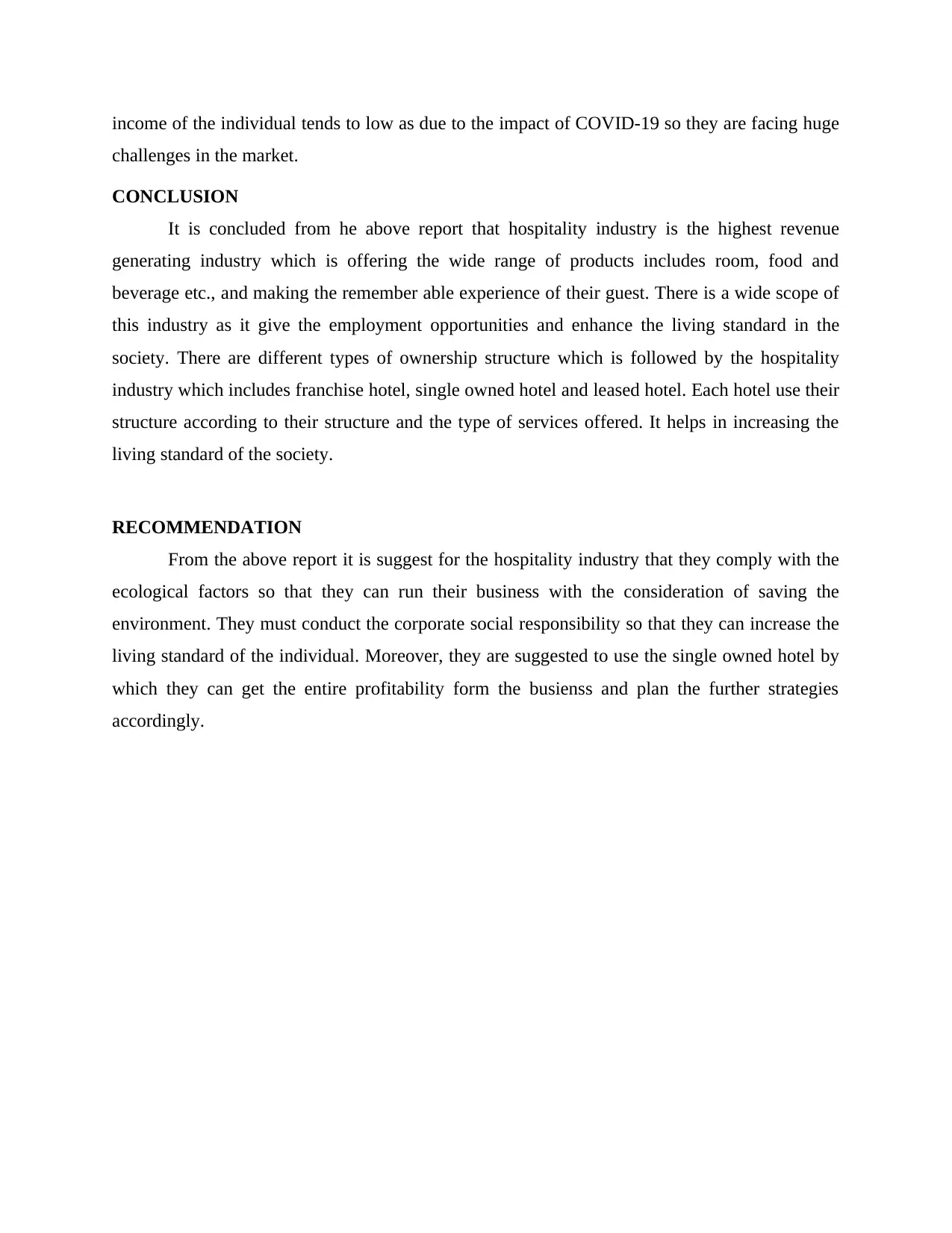
income of the individual tends to low as due to the impact of COVID-19 so they are facing huge
challenges in the market.
CONCLUSION
It is concluded from he above report that hospitality industry is the highest revenue
generating industry which is offering the wide range of products includes room, food and
beverage etc., and making the remember able experience of their guest. There is a wide scope of
this industry as it give the employment opportunities and enhance the living standard in the
society. There are different types of ownership structure which is followed by the hospitality
industry which includes franchise hotel, single owned hotel and leased hotel. Each hotel use their
structure according to their structure and the type of services offered. It helps in increasing the
living standard of the society.
RECOMMENDATION
From the above report it is suggest for the hospitality industry that they comply with the
ecological factors so that they can run their business with the consideration of saving the
environment. They must conduct the corporate social responsibility so that they can increase the
living standard of the individual. Moreover, they are suggested to use the single owned hotel by
which they can get the entire profitability form the busienss and plan the further strategies
accordingly.
challenges in the market.
CONCLUSION
It is concluded from he above report that hospitality industry is the highest revenue
generating industry which is offering the wide range of products includes room, food and
beverage etc., and making the remember able experience of their guest. There is a wide scope of
this industry as it give the employment opportunities and enhance the living standard in the
society. There are different types of ownership structure which is followed by the hospitality
industry which includes franchise hotel, single owned hotel and leased hotel. Each hotel use their
structure according to their structure and the type of services offered. It helps in increasing the
living standard of the society.
RECOMMENDATION
From the above report it is suggest for the hospitality industry that they comply with the
ecological factors so that they can run their business with the consideration of saving the
environment. They must conduct the corporate social responsibility so that they can increase the
living standard of the individual. Moreover, they are suggested to use the single owned hotel by
which they can get the entire profitability form the busienss and plan the further strategies
accordingly.
Paraphrase This Document
Need a fresh take? Get an instant paraphrase of this document with our AI Paraphraser
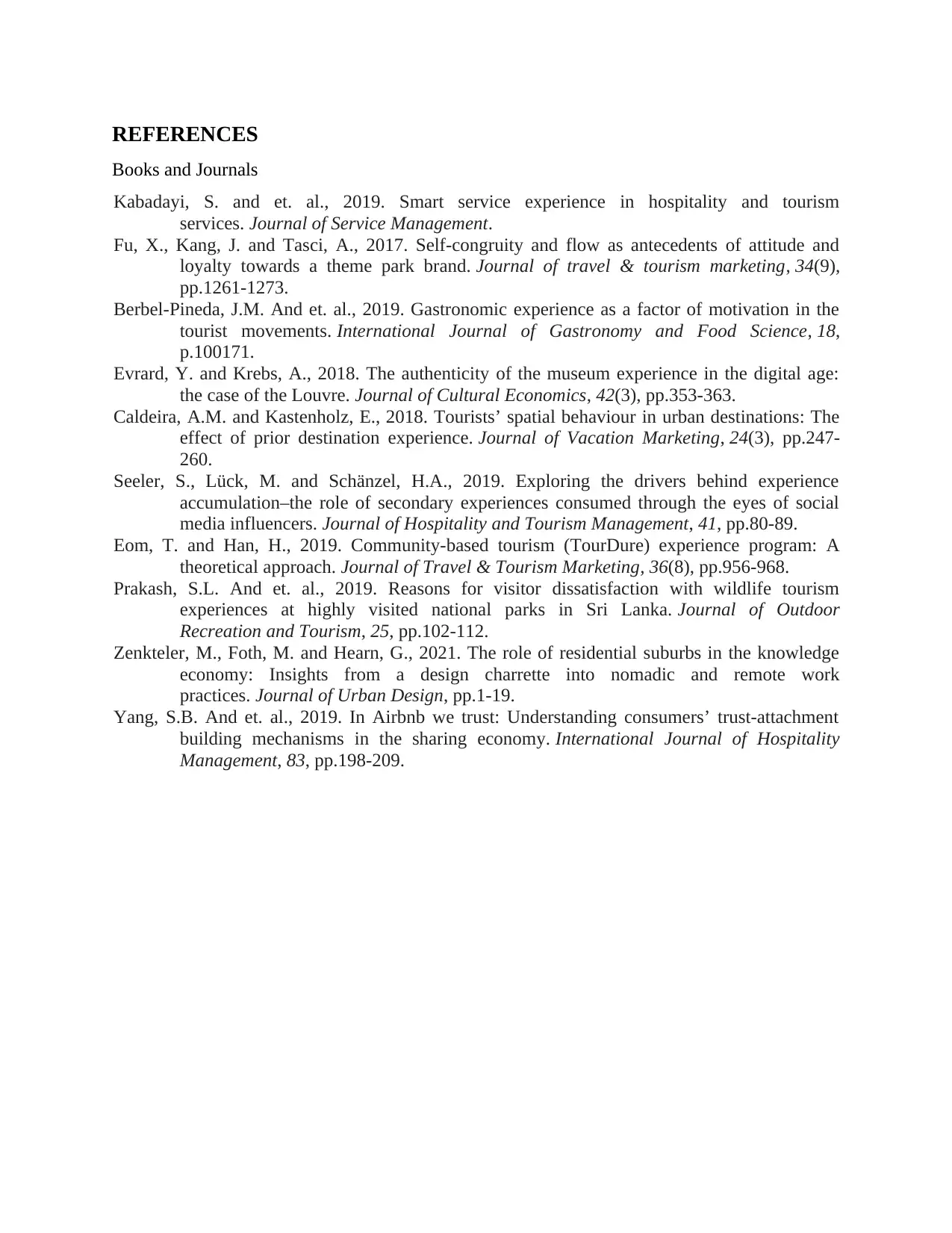
REFERENCES
Books and Journals
Kabadayi, S. and et. al., 2019. Smart service experience in hospitality and tourism
services. Journal of Service Management.
Fu, X., Kang, J. and Tasci, A., 2017. Self-congruity and flow as antecedents of attitude and
loyalty towards a theme park brand. Journal of travel & tourism marketing, 34(9),
pp.1261-1273.
Berbel-Pineda, J.M. And et. al., 2019. Gastronomic experience as a factor of motivation in the
tourist movements. International Journal of Gastronomy and Food Science, 18,
p.100171.
Evrard, Y. and Krebs, A., 2018. The authenticity of the museum experience in the digital age:
the case of the Louvre. Journal of Cultural Economics, 42(3), pp.353-363.
Caldeira, A.M. and Kastenholz, E., 2018. Tourists’ spatial behaviour in urban destinations: The
effect of prior destination experience. Journal of Vacation Marketing, 24(3), pp.247-
260.
Seeler, S., Lück, M. and Schänzel, H.A., 2019. Exploring the drivers behind experience
accumulation–the role of secondary experiences consumed through the eyes of social
media influencers. Journal of Hospitality and Tourism Management, 41, pp.80-89.
Eom, T. and Han, H., 2019. Community-based tourism (TourDure) experience program: A
theoretical approach. Journal of Travel & Tourism Marketing, 36(8), pp.956-968.
Prakash, S.L. And et. al., 2019. Reasons for visitor dissatisfaction with wildlife tourism
experiences at highly visited national parks in Sri Lanka. Journal of Outdoor
Recreation and Tourism, 25, pp.102-112.
Zenkteler, M., Foth, M. and Hearn, G., 2021. The role of residential suburbs in the knowledge
economy: Insights from a design charrette into nomadic and remote work
practices. Journal of Urban Design, pp.1-19.
Yang, S.B. And et. al., 2019. In Airbnb we trust: Understanding consumers’ trust-attachment
building mechanisms in the sharing economy. International Journal of Hospitality
Management, 83, pp.198-209.
Books and Journals
Kabadayi, S. and et. al., 2019. Smart service experience in hospitality and tourism
services. Journal of Service Management.
Fu, X., Kang, J. and Tasci, A., 2017. Self-congruity and flow as antecedents of attitude and
loyalty towards a theme park brand. Journal of travel & tourism marketing, 34(9),
pp.1261-1273.
Berbel-Pineda, J.M. And et. al., 2019. Gastronomic experience as a factor of motivation in the
tourist movements. International Journal of Gastronomy and Food Science, 18,
p.100171.
Evrard, Y. and Krebs, A., 2018. The authenticity of the museum experience in the digital age:
the case of the Louvre. Journal of Cultural Economics, 42(3), pp.353-363.
Caldeira, A.M. and Kastenholz, E., 2018. Tourists’ spatial behaviour in urban destinations: The
effect of prior destination experience. Journal of Vacation Marketing, 24(3), pp.247-
260.
Seeler, S., Lück, M. and Schänzel, H.A., 2019. Exploring the drivers behind experience
accumulation–the role of secondary experiences consumed through the eyes of social
media influencers. Journal of Hospitality and Tourism Management, 41, pp.80-89.
Eom, T. and Han, H., 2019. Community-based tourism (TourDure) experience program: A
theoretical approach. Journal of Travel & Tourism Marketing, 36(8), pp.956-968.
Prakash, S.L. And et. al., 2019. Reasons for visitor dissatisfaction with wildlife tourism
experiences at highly visited national parks in Sri Lanka. Journal of Outdoor
Recreation and Tourism, 25, pp.102-112.
Zenkteler, M., Foth, M. and Hearn, G., 2021. The role of residential suburbs in the knowledge
economy: Insights from a design charrette into nomadic and remote work
practices. Journal of Urban Design, pp.1-19.
Yang, S.B. And et. al., 2019. In Airbnb we trust: Understanding consumers’ trust-attachment
building mechanisms in the sharing economy. International Journal of Hospitality
Management, 83, pp.198-209.
1 out of 8
Related Documents
Your All-in-One AI-Powered Toolkit for Academic Success.
+13062052269
info@desklib.com
Available 24*7 on WhatsApp / Email
![[object Object]](/_next/static/media/star-bottom.7253800d.svg)
Unlock your academic potential
Copyright © 2020–2025 A2Z Services. All Rights Reserved. Developed and managed by ZUCOL.





